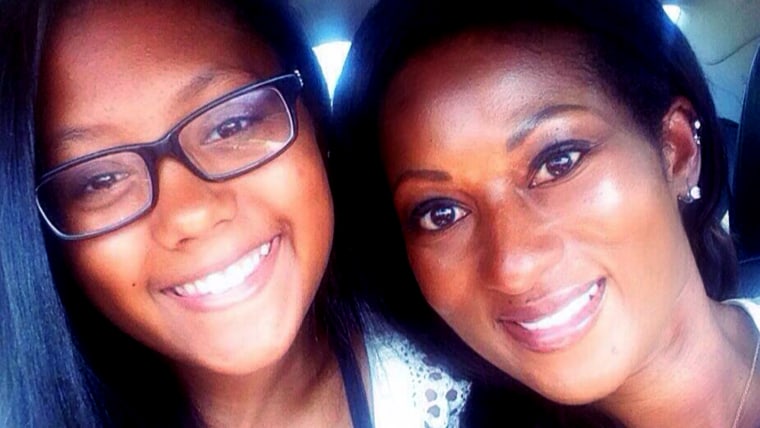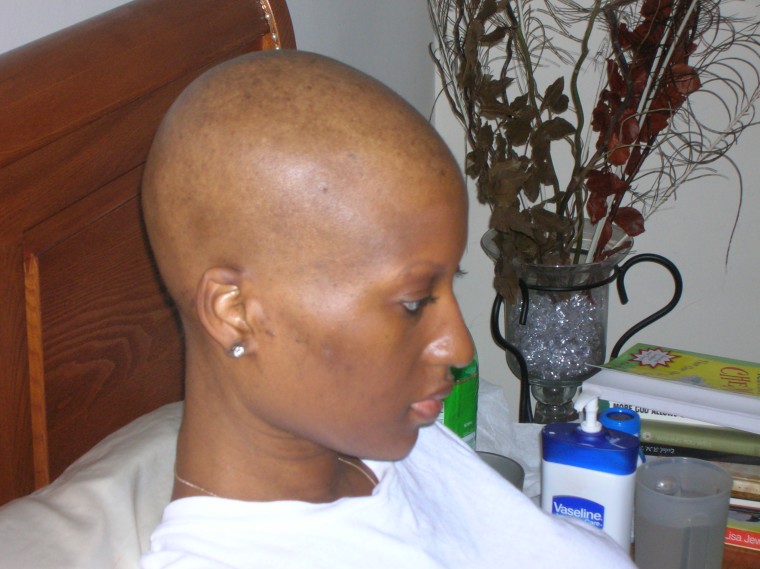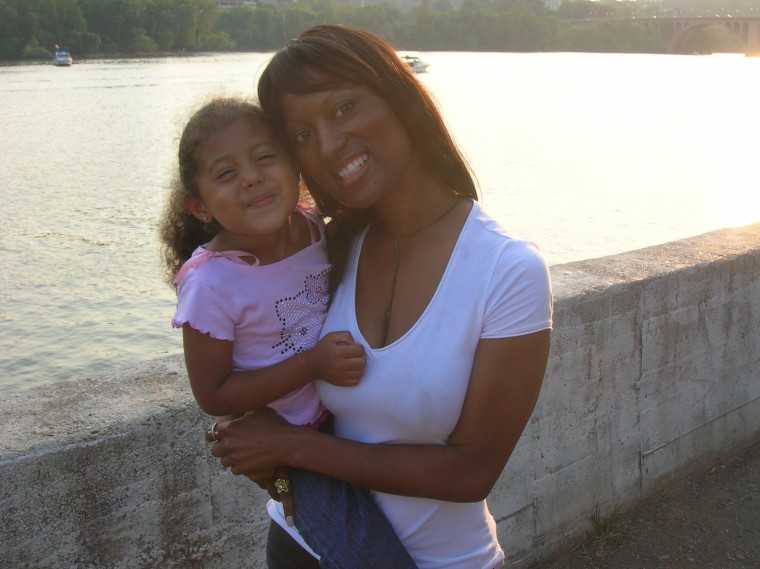Maimah Karmo was diagnosed with breast cancer in 2006. At the time, she was a 32-year-old single mother with a 3-year-old daughter, Noelle. She wondered how to tell the girl about the diagnosis and was determined to turn it into a positive, empowering experience. Karmo is now cancer-free and the founder of the Tigerlily Foundation, a breast cancer support, education and advocacy organization.
Karmo shares her story with TODAY’s A. Pawlowski.

My mom is a nurse and she taught me at 13 the importance of knowing my body. She sat me down and said, “You’re getting breasts. Let me show you how to check them so if something happens when you’re older, you know what to look for. If you find out early, you’ll be fine.”
She kept reinforcing that to the point where it became a habit for me. I would do my breast self-examination every month in the shower. I did that religiously for 18 years and then at 31 years old, I felt a lump in my breast. I knew right away that it did not belong there.
There’s no history of cancer in my family, so I didn’t think it could be cancer. I got a mammogram and it came back clean. They said, you have a cyst, it’s not cancer. I insisted on a biopsy, but I was told to come back in six months to a year. So I waited.
I finally had a biopsy. The next day was Feb. 28, 2006, and the doctor called me at 4:45 p.m. to tell me that I had breast cancer. It was aggressive and it was triple negative breast cancer. It was so surreal. I just thought: This is it, I’m done.
My daughter was 3 and I just was in sheer panic. My whole life revolves around her, I’m a single mom. My first thought was: How can I leave her without a mom?
In my office, there are pictures of Noelle everywhere. She’s my world. I kept looking at the pictures and thinking: She’ll never get to know me as a woman; I’m never going to have those moments with her that teach her how to live, how to love. She won’t know how much I love her.
The most gripping fear I had wasn’t about my life, it was about “I can’t leave her.”

I was in shock so I had to figure out what to say to her. Everyone said, you can’t tell her about this, she’s too young to understand. But to me, that’s not respecting my child as a human being.
Here are my five tips on how to talk to your child about breast cancer:
1. Focus less on timing, and more on tact
Don't make it a "serious" conversation. Your child is only going to mirror your energy, so if you sit her down and you're serious and stressed, that's what she is going to feel. Tell your child in a familiar setting while doing something you normally do, like playing on the floor or going for a walk.
Don’t forget to show your child affection and reassure her. She might be scared of losing you, so it’s important to hold her hand or sit close when you're sharing the diagnosis.
2. Simplify the explanation and make it age appropriate
I just sat my daughter down and said, “Hey pumpkin, I have a boo-boo. It doesn’t hurt, but it has to come out. I’m going to have to have surgery to take this out and so I won’t be able to wrestle and play with you for a while, but I’ll be fine soon. Then I’ll have to have some treatment and medicine and my hair will fall out.”
There’s this cartoon character without hair called Calliou. I told her, “I’ll look like Calliou for a while.” And she said, “I like Calliou, but I don’t want you to look like him.” I told her, I’ll still be your mommy, I’ll love you forever.
With older kids, you might mention superheroes or favorite role models and talk about how even they get hurt sometimes and need medicine to feel better. You might say there are ways to try and make cancer go away, but it takes time and may wear down a person’s body, like the flu.
3. Don’t underestimate your child's intelligence
Children are very perceptive, but people often underestimate their capacity to understand things.
When I had chemotherapy, my family said, “Don’t tell her. Just put your wig on.” My hair began to fall out and I finally had to shave my head. I came to school one day with my wig on and Noelle asked me, “What’s on your head?” and I said it’s my hair, and she replied, “No, it’s not. I don’t like that.” I knew I had to tell her the truth.
I took the wig off at home and when she saw me, she ran from me and started crying. She wouldn’t look at me and said, “Where’s mommy?” I knelt on the ground and I said to her, “I’m your mommy, I just lost my hair. I told you I had to have medicine, but it’s me. You don’t have to touch me or hug me if you don’t want, but just come over and just know me.” She came over and put her nose towards my neck and she smelled me and said, “Oh mommy, it’s you.” Then we hugged.
I said, “The medicine took my hair away, but my heart is the same and the way I love you is the same. I’m going to get sick, I’m going to throw up and be really tired.”

4. Be honest with yourself, and with your daughter
Before you talk to your child, make sure you talk to yourself first. What is your perspective on your diagnosis? Are you feeling positive and hopeful? Scared? Angry? If so, be ready to be honest with your child about those feelings as you talk with her.
It’s a hard thing to tell a child. My daughter asked me if I was going to die, and I said, “Not today.” I told her I’m going to get through this.
I had a lumpectomy, followed by chemotherapy and then radiation. I got diagnosed in February and finished treatment in November.
I had the opportunity to really teach my daughter some powerful lessons during this time about me as a woman, a human being. I was going to be vulnerable, but I could be strong at the same time. It taught her the importance of kindness and compassion, that it’s OK to have challenging times.
Taking the attention off the disease and putting it on life lessons is really important.
5. Educate her on the value of advocating for herself on her health
My daughter has heard about breast self-awareness her whole life. Now that she’s almost 13, we’ve had the same conversation that my mother had with me when I was her age.
I had the BRCA test and I don’t have the gene, so Noelle knows that. But it’s not just about the gene. She has a history of breast cancer in her family from her mother. We talk a lot about how to check her body, do her breast self-exams once a month and how nutrition, exercise, diet and lifestyle impacts that risk.
When I was diagnosed with breast cancer, I didn’t have the knowledge I needed to not be so afraid. I went into it totally in a place of fear. What I want to give her is a sense of empowerment, a sense that she can make decisions for herself if she knows the facts early on.
Her perspective went from being afraid of cancer to being a warrior.

Today, I feel like a million bucks. I’m the happiest I’ve ever been. I would not undo my cancer. I’m very thankful for the journey and what it taught me.
People can live their whole lives and not appreciate the value of every minute. I just ran five miles. There were times when I couldn’t get out of bed to walk to the bathroom, I was so weak. Knowing that, I appreciate a body that’s healthy and doesn’t feel pain.
It gives you a whole new appreciation for everything. Nothing is bad, it’s just life.